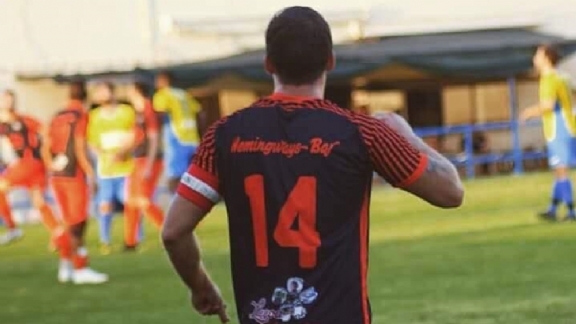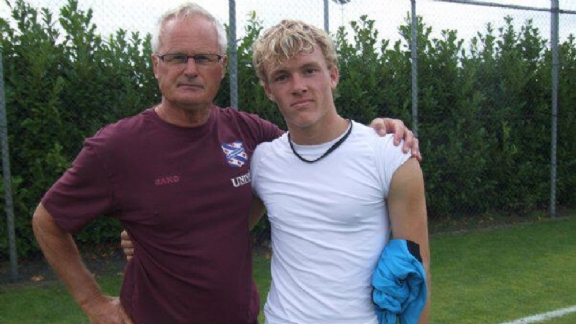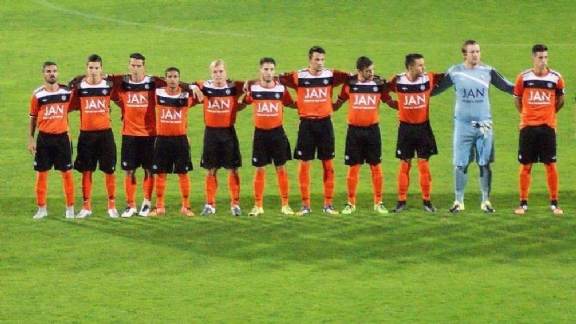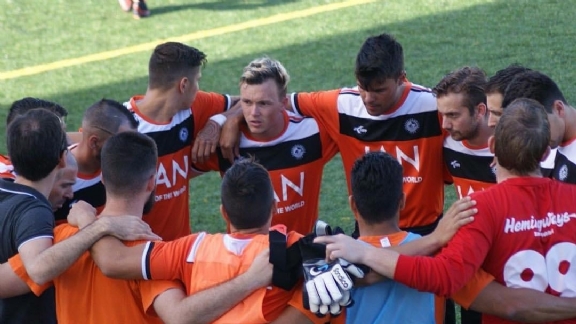Tuesday, 15 September 2020 at

When Yannick Nicklaus returned from the Netherlands disillusioned after his dream of becoming a professional footballer, the plan to start his own club in the Algarve was born as a fantasy. Now, six years later, Carvoeiro United is a household name in the South Portuguese region, acting on the fourth level. As player, captain and president, the now 28-year-old Nicklaus is so proud of a peacock at the club, which he considers to be ‘his baby’.
By Chris Meijer
How on earth do you start a club in Portugal out of nowhere? Nicklaus laughs when thoughts go back to the summer of 2014. At that moment he had just returned from the Netherlands, where he saw his dream of still playing professional football go up in smoke. Nicklaus, born in Portugal as the son of a Dutch mother, was a gifted soccer player, played a number of years in the youth training of Portimonense from nearby Portimão and was always active at the highest level of Portuguese youth football. Nevertheless, a professional career beckoned remarkably enough in his second fatherland. “At the age of eighteen I was scouted by Foppe de Haan through an intermediary for sc Heerenveen, I was allowed an internship. I don’t know how he got to me, but I was approached by an intermediary who told me that Foppe was impressed. If you like it, you can come to Heerenveen for a trial period,’ I was told. Foppe was quite laudatory and I saw it as a great opportunity”, Nicklaus told to Football zone.

Nicklaus during his internship at sc Heerenveen with Foppe de Haan.
Nicklaus went to Friesland in good spirits, but it soon became clear that the internship period would not result in a contract with Heerenveen. He didn’t want to give up too quickly and chose to move in with his family in The Hague. “I also wanted to see what life was like in the Netherlands and was looking for a good amateur club in the neighbourhood, which eventually led me to Scheveningen. Nicklaus was raised Dutch and as a child watched television programmes from his mother’s native country. He speaks flawless and fluent Dutch, although he occasionally has to search for the right words. Therefore, despite spending his entire childhood in Portugal, the Netherlands had few secrets from him, except in the field of football. “In Portugal it’s not as tactical as in the Netherlands, football is more aggressive and dirtier. If you don’t watch, things happen. When I trained at Scheveningen in the beginning, they said: ‘If you play like that, you take a yellow card every game’. It was a big step, for example, 4-3-3 was played everywhere instead of all kinds of different systems.”
Nicklaus didn’t always get around to playing in Scheveningen at that time and had, in his own words, seen it again after a year. “I had a little dream to become a professional football player, but that didn’t work out and then I decided to go back to Portugal. To stay in the Netherlands only for amateur football… No, I’d rather sit at home with my family in good weather. It’s not nice if you don’t feel your feet from the cold during training”, Nicklaus laughs. An experience richer, but an illusion poorer he returned to the Algarve. The fact that Nicklaus saw his dream go up in smoke took away the motivation to go and play football somewhere in Portugal right away. Initially he planned not to be active in a club for at least a year. In the so-called five-a-side with friends, he had to find the joy of football again.
A conversation with his parents changed things. Carvoeiro has literally everything: golden yellow beaches with a crystal clear sea and a bustling centre built against a steep rock. But until six years ago, the nearly three thousand (predominantly international) inhabitants of this fishing village did not have their own football club. “We went to see what we needed to establish one. Without my mother Marianne Schuyffel we would never have succeeded. There were a lot of boys who wanted to join the new club. We set up some friendly matches and they were won big, so then the dream really started to live”, Nicklaus explains. The fact that Carvoeiro didn’t have a football club yet wasn’t the only motivation. For foreign players it can be quite complicated to find a club in Portugal. “For example, you have to pay extra if you have to be transferred from abroad. Portuguese clubs don’t want to pay for that, so it’s always a hassle for foreign players to hook up somewhere”.

“This region of the Algarve is home to many foreigners: English, Germans, Irish, you name it. In the first year we had six or seven foreigners, that’s where the name of United comes from. We wanted to have an international character, something different from normal Portuguese clubs”, Nicklaus continues. Even though there was enough enthusiasm, it wasn’t necessarily easy to set up a club from scratch. “We just had to have a clubhouse right away, statutes had to be drawn up and a board had to be elected”, he sums up. “The police had to be present every match, you have to pay for that as a club. Furthermore you have to be able to facilitate the referees and the radio. The first season cost twenty thousand euros, only to participate. That’s quite a lot of money for a club that has nothing yet. But because there are relatively few clubs in the region, the necessary sponsors were immediately willing to support the club”.
The municipality of Lagoa, of which Carvoeiro is a part, also lent a helping hand and arranged accommodation, which, although still located outside the fishing village. With this all the conditions were in place to be able to start the season in any case. At the age of 22, Nicklaus was elected vice-president on the board of his self- founded club, alongside Portuguese president Sandro Pacheco and English treasurer John Wilson. In September 2014, Carvoeiro United played its first official match on the fifth level of Portuguese football, not entirely coincidentally in orange uniforms. The first home game was visited by some six hundred spectators, which was a huge windfall for the new club. “We didn’t have the money for the whole season yet, so we hoped that the necessary people would come and watch and we could make a lot of money with the ticket sales. We had the idea that fifty or sixty people would come to watch, but that turned out to be ten times as many. That made it easier, there was a lot of interest in the first year. A group of fans with flags, fireworks, horns, that sort of thing comes along regularly. The people were very enthusiastic, that they had their own team to support next to the three big clubs in Portugal”.
In sporting terms, the first season offered more challenges for Carvoeiro United. “You only have five levels in Portugal, so you start directly in the fifth division and that’s equal to teams that pay their players. The first year was pretty difficult, everyone thought we’d be last. We had the idea ourselves: we’ll see where the ship ends up. We started very enthusiastically, nobody knew us and in the first three games we got seven points. They thought: where do these guys come from? Carvoeiro is a small village, many people only know it from the beach. They didn’t even know where the club was. But after that it became more difficult, referees approached us differently when we played against bigger clubs. We finished second last, while we were still in the middle of the winter break. Everybody had to go back to work in the bars or restaurants in the summer, so players couldn’t come to train or play. That did have consequences for our level. Anyway, there were boys between those three or four years who hadn’t played soccer. But we couldn’t refuse them, because we weren’t really in a luxury position in terms of players”.

The team of Carvoeiro United. Nowadays the nephew of former Arsenal defender Tony Adams also plays for the club of Nicklaus, as goalkeeper.
It made Carvoeiro United decide to change tack after the first year. A trainer with experience at the third level of Portuguese football was recruited, the club started training three times a week and brought in a physiotherapist. The players also no longer had to pay or wash their own shirts. “In the first season, sponsors or players paid for their registration themselves. That in itself was funny, that a bar or restaurant paid a player. But it was also necessary. Everything is now arranged for them, even though they can’t live off it. In Portugal you can only live on a football salary if you play at the second level or higher. On the third level you get six or seven hundred euros a month.” Nicklaus himself was given the opportunity to step up a number of times, towards the third level of Portuguese football. “After the first year I had the necessary offers to move up to the third level, because many people didn’t know that I was so involved in the club. I’m sorry, but I’m vice-president and I’m not leaving,” I said to those clubs. I always tell my friends that I would do it if I didn’t have to work next to football. If I stay a part-time soccer player, I don’t get much out of it.”
No, Nicklaus prefers to take more steps with his Carvoeiro United. After three years, the club managed to get promoted for the first time, so they are now acting on the fourth level of Portuguese football. “How we are doing now, it is not really realistic to promote to the third level. Then you will go all over Portugal, to Lisbon, and that involves a lot of costs. We went a bit too fast for the club’s ability. Actually, we weren’t really prepared for the fourth level. We were given the choice if we wanted to go up, but we did it and would see how it went. We solved that by registering fewer players, for example,” Nicklaus explains. Because of the promotion, Carvoeiro United has become more and more attractive for ambitious, young players. “Boys who have lost weight in professional clubs, for example. Also because there are guys who have made another step up from Carvoeiro”.
As of next season there will be an additional layer in the Portuguese football pyramid, causing Carvoeiro United to drop a level. Nicklaus expresses the ambition to eventually grow into a stable club on the third or fourth level, with its own stadium. “That is the dream, to play a match in our own stadium. It is a goal to achieve that within ten years. I’m sure a lot more people will come to watch if we play within our village. We have submitted plans to the municipality and if they have time or money, they want to start building. If we play at a higher level, the interest increases and our current terrain becomes too small, it will go a lot faster. I hope to experience it as a player. But if I’m not good enough anymore, I’ll quit. That also makes it easier to focus on other activities.

Nicklaus is not only the captain of Carvoeiro United, because he was elected president during the board elections two years ago. “As vice-president, I already arranged a lot, so I had to get a lot of people around me who could help me. In the first two or three years I was not always with my head at the games, because everything had to be arranged. We now have a team of six or seven people running the club. Also for a match or training. Last week for example we had a dinner with sponsors, I don’t have to worry about that anymore. Or that the balls and shirts are taken to away games.” The presidency has also had consequences for his private life, he confirms with a smile. “You get a lot older and learn how the football world works. I couldn’t go out with those guys like I used to, to be president of the club the next day. They can’t understand that, it’s not so correct in Portugal. People pay for a membership, then you have to be more serious. So I went out a lot less from then on. As a player/president, it’s also hard to tell certain guys that they’re not good enough. Because are you a player or a president now? They’re your friends, too.”
A small sigh sounds after the question whether it is heavy to combine the presidency with his job in a hotel. “You don’t always have the energy to answer a few mails after work, but you love the club and you do it because it’s your baby. You feel the club in a different way because it’s your child. You notice that injustice, then you react differently. You put so much time and money into the club, you react worse if you feel you are being robbed”, confesses Nicklaus. With a broad smile he concludes: “It makes you proud, so to speak. When I walk in the village and see people with those orange shirts, I think: “So, I just set this up with some friends”.
